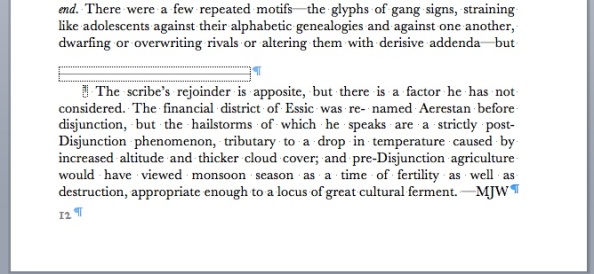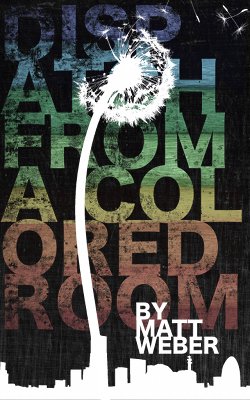Ed Ditto’s tutorial on creating print manuscripts from Scrivener is required reading for self-publishers. It’s gotten me a huge portion of the way to formatting The Dandelion Knight for print, and I thank him for his service (and Garrett Robinson for the video version, which I haven’t watched yet but would like to one day). But, through no fault of Ed’s, the process fails at one step that is critical for me and perhaps no one else.
Footnotes.
I know. Let’s just stipulate that they’re necessary. But, if you’re compiling to PDF, Scrivener forces you into a Sophie’s choice with footnotes—use Proofing layout and lose some fonts (as well as some amount of control over whether your pages end up recto or verso, at least allegedly), or use Publishing layout and tolerate endnotes. I refused to give up IM Fell for my title page and chapter titles, and I refused to tolerate endnotes. So I opted to compile from Scrivener to Word.
Unfortunately, there are a few aspects of the conversion that weren’t great. They’re all manually fixable, but they do kind of need manual fixing. I’ll show some screenshots.
Problem 1: Author and title are too close to the main text.
Solution: This is easy but annoying—manually go through the headers and change them. Unfortunately, Scrivener makes each chapter heading into its own “section” and edits to one don’t propagate through the rest. I’ve tried to fix this in styles but haven’t managed to figure it out.
Problem 2: Footnotes are the same size as the rest of the text. (Oops, it looks like a useless hyphen has also crept in.)
Solution: Also easy, not annoying: Just put your cursor into a footnote, select all, and change the size.
Problem 3: Pages don’t always end on the same line. (In its “two pages” display, Word displays odd pages on the left and even on the right, because it starts with 1—so don’t worry that the odds and evens are on the wrong side or that the margins are reversed for recto and verso. At least, I think you shouldn’t worry.)
Solution: Select the entire main text, then go to Format -> Paragraph. Click “Line and Page Breaks,” then deselect “widow and orphan control.” You want to select all because the document is divided into different sections; the last thing you want them to do is treat widows and orphans differently!








